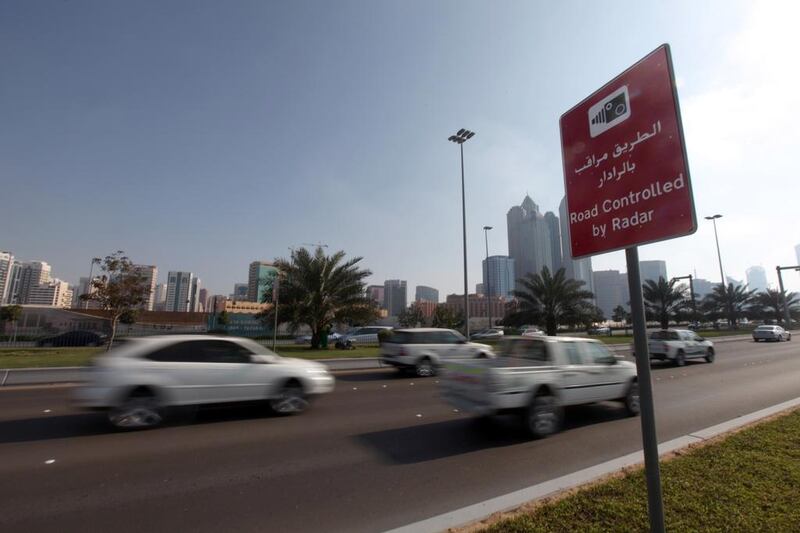ABU DHABI // The days are numbered for drivers who put their foot down after passing a roadside radar and slam on the brakes as they approach the next one.
By the end of the year Abu Dhabi’s main roads will have detection systems that calculate the average speed of a vehicle between two fixed points.
The new system will catch speeding drivers who slow down as they pass the existing fixed radar cameras.
“Everyone travelling here in Abu Dhabi has to make sure to drive within the speed limit,” Dr Atef Garib, a roads and traffic expert at Abu Dhabi Police, said at the International Road Traffic Accident Conference in the capital. “We will have this point-to-point system and it will be very soon.”
Dr Garib said traffic police were working on closer integration of the different strands of their approach to road safety.
“We focus on enforcement and we have a balanced strategy which deals with physical or face-to-face enforcement and automated enforcement,” he said.
“On-the-spot enforcement has proven to be very effective. You get a ticket right away, you ask yourself what you did wrong so you behave better.”
There are three systems for automated enforcement: fixed radar cameras, infrared cameras at traffic junctions and mobile radar cameras, and the radar guns.
“We are trying to integrate them to make sure that everything is coordinated,” Dr Garib said. “For example, if we don’t have a speed camera at a certain location, we will ensure that we will have a mobile camera, a speed gun or a patrol car. All of these are integrated to ensure drivers are not speeding as you know speeding increases the risk of a crash.”
Abu Dhabi has initiatives to raise awareness among the community on the dangers of speeding, he said.
“We certainly have one of the most advanced enforcement systems in the world but education is important. Schools can educate students on traffic safety, and labour camps can teach the importance of using safe pedestrian crossings.
“In four years, from 2010 until now, pedestrian fatalities have been reduced by 60 per cent. That is a huge achievement.”
The UAE averages 1.7 road deaths per day. Abu Dhabi has 0.8.
“We had 288 road fatalities last year, and 271 in 2012 so we are focusing on reaching zero by 2030,” Dr Garib said. “We want to reduce it by at least 5 per cent or more every year. If we wish to achieve a 50 per cent reduction, it would mean 0.5 deaths per year.”
Brendan Halleman of the International Road Federation in the United States praised Abu Dhabi’s efforts to enhance road safety.
“If you look at Abu Dhabi’s target in terms of reduction of road fatalities and serious injuries, it closely mirrors the target set by the UN Decade of Action at a global level, which is to save five million lives, and prevent 50 million serious injuries by 2020.”
Abu Dhabi is instrumental in shaping the agenda, and Abu Dhabi Municipality is represented in the UN Road Safety Collaboration, an informal consultative mechanism whose members are committed to road safety efforts and in particular to the implementation of the recommendations of the world report on road traffic injury prevention.
“Abu Dhabi has decided to aggressively tackle road safety injuries and at the time when it is building new roads and experiencing a growth in population and motorisation,” Mr Halleman said.
rruiz@thenational.ae






